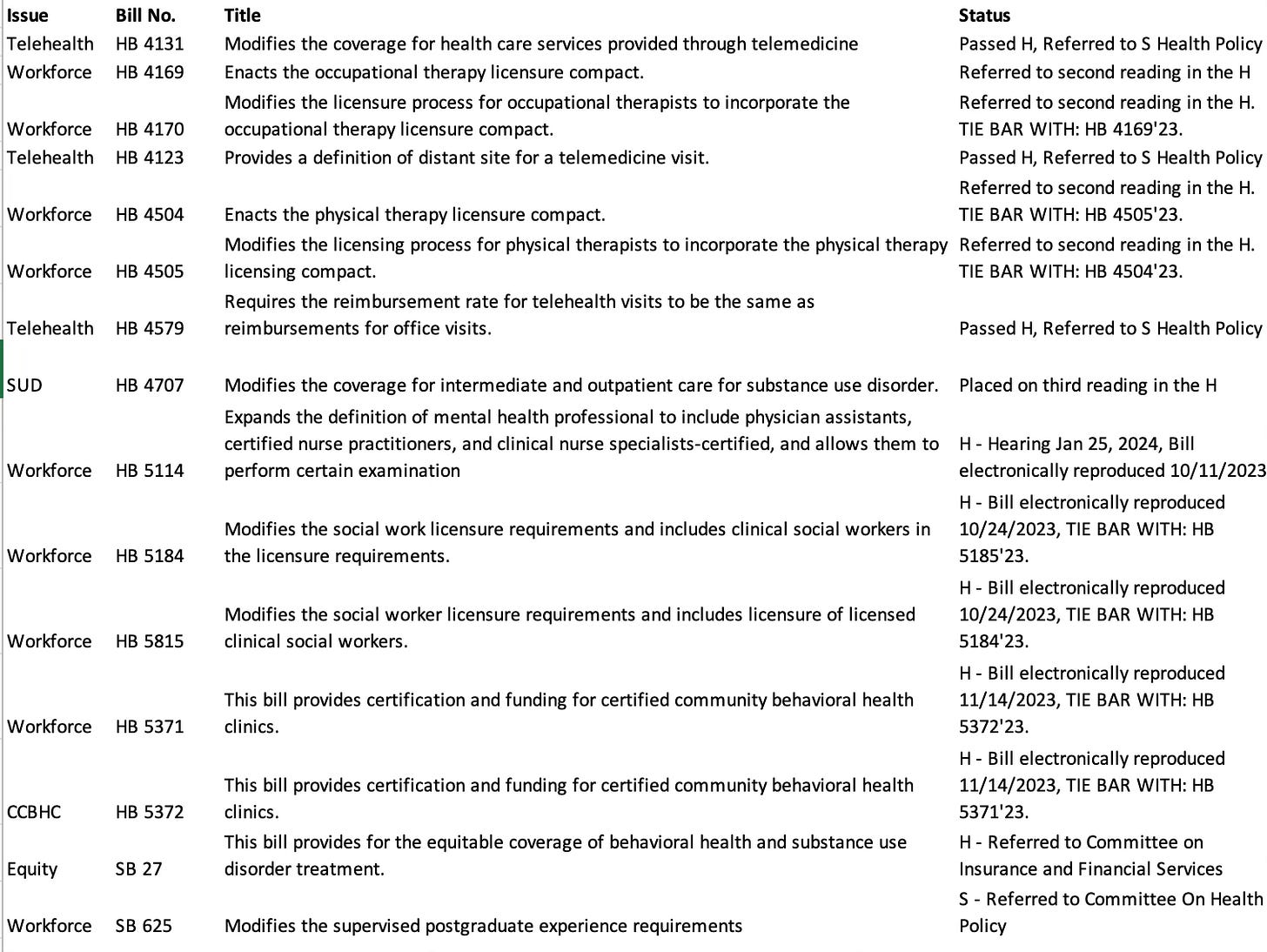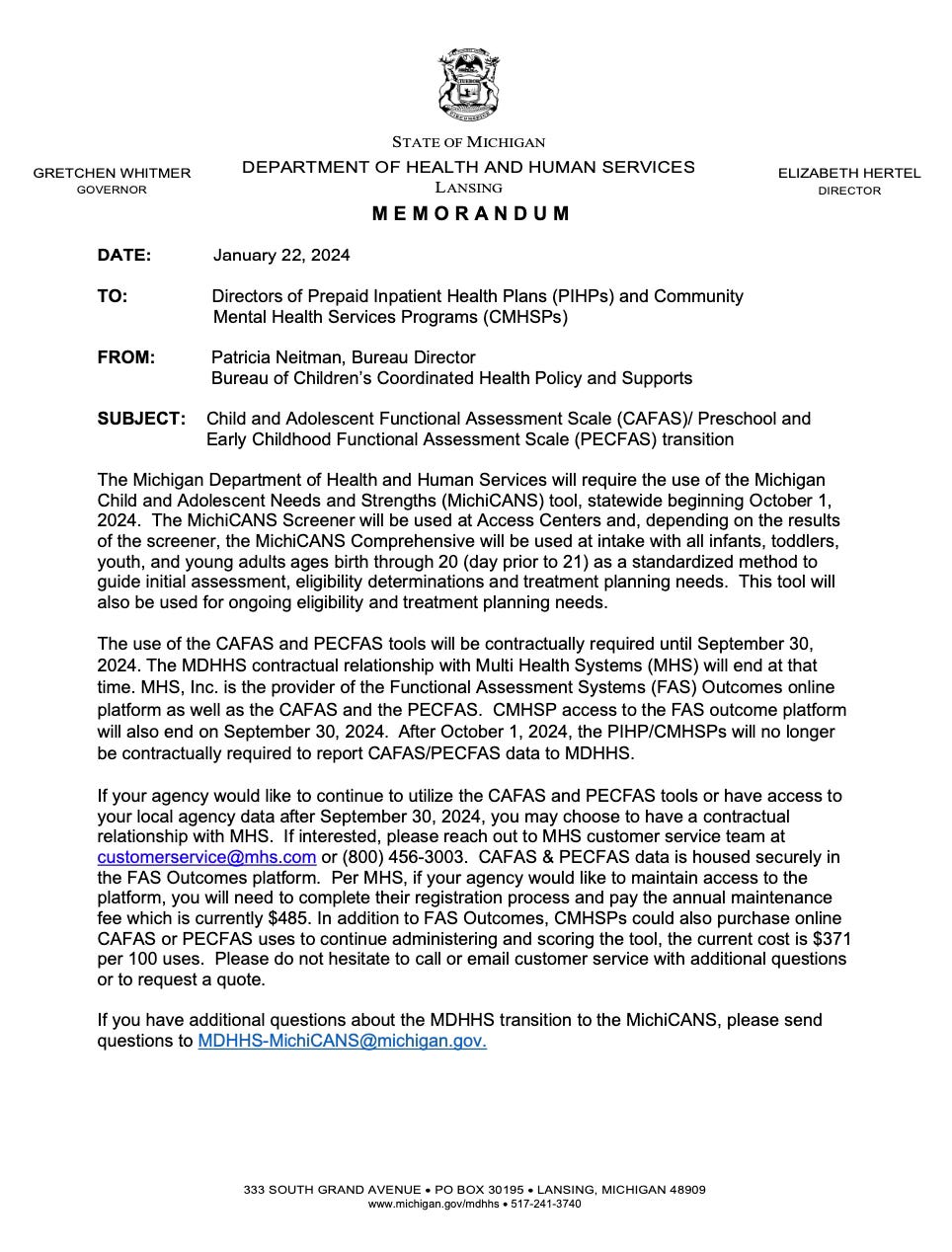Provider Updates: Michigan
Week of JAN 22 2024
Legislation we are monitoring
Below is a list of legislation we are watching in the Michigan Legislature. Governor Whitmer is giving her State of the State this Wednesday, which you can watch on Michigan.gov, YouTube, or regular news if they cover it. The House Behavioral Health Policy Committee is meeting this Thursday, January 25th, to discuss HB 5114. This bill expands the definition of mental health professionals to include physician assistants, certified nurse practitioners, and clinical nurse specialists-certified, allowing them to perform certain examinations.
MDHHS Updates
Medicaid Coverage of Community Health Worker/Community Health Representative Services
On January 10, 2024, the MDHHS Behavioral Physical Health and Aging Services Administration team gave a presentation highlighting the CHW services now covered by Medicaid. To learn more about the new CHW policy, Final Medicaid CHW Policy Effective January 1, 2024, and view the Consultation Summary CHW Medicaid Coverage. Want to learn even more, contact Natasha Radke, RadkeN1@michigan.gov, Emily Morris, MorrisE10@michigan.gov, or for more information regarding social workers, contact Dr. Amy Lee, Michigan Workforce Training and Education Collaborative alee@mwtec.org. Or watch this CBS News Detroit story on Michigan CHW Services.
MDHHS is looking for health center programs for children and teens.
The Michigan Department of Health and Human Services (MDHHS) wants the public and nonprofits to help expand school-based or linked health services through Child and Adolescent Health Centers and School Wellness Programs. The grant has $4.46 million available with a maximum award of $330,000 and a minimum of $180,000 for local health departments, community health centers, community mental health agencies, federally qualified health centers, nonprofit hospitals, school districts, Michigan tribes, and other qualified to provide health care for schools. The deadline is 3 p.m. March 12, and a 90-minute conference for the grant will be held at 11 a.m. Jan. 23. The webinar will be available remotely. Source MIRS.
Michigan Implements New Youth Assessment Tool
Starting October 1, 2024, the Michigan Department of Health and Human Services (MDHHS) will mandate the statewide use of the Michigan Child and Adolescent Needs and Strengths (MichiCANS) tool for assessing infants, toddlers, youth, and young adults up to the age of 21. This tool will be utilized for initial assessments, eligibility determinations, and treatment planning at Access Centers. The current tools, CAFAS and PECFAS, provided by Multi Health Systems (MHS), will be required only until September 30, 2024, with the MDHHS-MHS contractual relationship and access to the FAS Outcomes platform ending on that date. Post-September 30, agencies wishing to continue using CAFAS and PECFAS or access their data must establish a separate contractual relationship with MHS, including an annual maintenance fee and additional costs for continued tool usage. This change signifies a significant shift in the approach to assessing and planning treatment for young individuals in Michigan's healthcare system.
Legislative Updates
Child Mental Health Bill Stalled.
Last year, Rep. Dan Lauwers' bill, SB 227, aimed at protecting children in mental health facilities, passed with significant support. However, recent attempts to modify it to align with a new law requiring hydration stations in childcare centers met resistance. The bill's amendment was blocked in a tied vote, lacking the necessary majority due to absences and two vacancies in the House. The opposition stemmed from a previous conflict between Senate Bill (SB) 88 and House Bill (HB) 4340, which address clean drinking water but are credited differently. SB 88, sponsored by Sen. Sylvia Santana, was chosen over Rep. Curtis VanderWall's identical HB 4340, causing discontent among House Republicans. Republicans informed only hours before the session about the vote on SB 227 and felt the notice was insufficient. Their spokesperson, Jeremiah Ward, emphasized their refusal to support a substitute that would leave SB 88 unchanged, a law they initially opposed. The Democratic spokesperson, Amber McCann, criticized the Republicans for their stance, highlighting the bill's importance for the safety of children in mental health facilities and its connection to ensuring clean water in childcare settings. She accused the Republicans of consistently neglecting child safety in various environments. Source MIRS.
Direct Care Worker Shortage
According to the Detroit Free Press, in her upcoming State of the State Address, Governor Gretchen Whitmer of Michigan is set to propose the "Caring for MI Family Tax Credit," a plan aimed at providing substantial tax relief for caregivers. This initiative, offering up to $5,000, is designed to alleviate the financial burden on families who incur significant expenses while caring for seniors and children with long-term needs. This move comes in response to the substantial out-of-pocket costs shouldered by unpaid caregivers, which, according to a 2021 AARP study, average around $7,242 annually. The proposal acknowledges the disproportionate impact of caregiving responsibilities on women, particularly affecting their workforce participation and highlighting racial disparities in caregiving roles.
In other DCW News…
How can Michigan solve its growing healthcare workforce shortage? Second Wave Media
Efforts Under Way To Address Shortage Of Direct Care Workers Across U.P., Radio Results Network
Direct care worker information meetings offered in the UP, Daily Press
Caregiver Incentive Project to hold informational meetings in Munising, Manistique, TV 6
New voucher program pays for caregivers in Livingston to take a break, Livingston Daily
Michigan org. provides support for caregivers of MI's aging population, WXYZ ABC TV Detroit
Gesher's New Caregiver Apprenticeship Program…
Southfield-based Gesher Human Services has launched a new caregiver apprenticeship program in collaboration with Michigan Works! to address staffing shortages in the care sector. This year-long, paid apprenticeship offers a nationally recognized caregiver credential and guaranteed job opportunities within Gesher, which serves disabled and elderly clients. Inspired by traditional apprenticeships in trades like plumbing and electrical work, the program is designed to bring new talent into human services and caregiving. Apprentices will receive comprehensive training, including health information privacy laws and independent living support skills, and start at an hourly wage of $15.32, with full benefits from day one. This initiative, funded by state and federal sources and Gesher’s budget, aims to fill critical gaps in caregiving and create sustainable career pathways in the social services sector. Learn more in Crain’s Detroit Business.
For context and perspective, tt is helpful to see what is happening in other states. Montana, for example, recently announced pay raises and bonuses for “health facility employees.” And here is how Alaska and New York use ARPA funds to address the DCW problem.
CMS Announces Model to Advance Integration in Behavioral Health
The U.S. Department of Health and Human Services, through the Centers for Medicare & Medicaid Services (CMS), is announcing a new model to test approaches for addressing the behavioral and physical health and health-related social needs of people with Medicaid and Medicare. The Innovation in Behavioral Health (IBH) Model’s goal is to improve the overall quality of care and outcomes for adults with mental health conditions and/or substance use disorder by connecting them with the physical, behavioral, and social supports needed to manage their care. Learn more in their news release. In his first State of the Union, President Biden laid out the Administration’s vision to transform behavioral health by strengthening system capacity, connecting more Americans to care, and supporting the well-being of Americans by creating healthy environments. You can find the latest progress report and roadmap in this news release.
Other Updates
From our partners
Improving Mental Health care: The Access Report (Michigan), from Inseperable
ICYMI: In Case You Missed it
Michigan disbands racial equity group as tension mounts over opioid money, Bridge Magazine
CMS Announces New Model to Advance Integration in Behavioral Health, CMS
Detroit Gets $1.6M from Dept. of Justice to Combat Drug Use and Abuse, Michigan Chronicle
Mental health outreach reduces stigma and raises awareness of services, Flint Side
Michigan agency still struggling to house foster kids, unite siblings, report finds, Detroit News
Advocates for Michigan foster youth hope education reforms will pass this year, Chalkbeat
Michigan Department of Health & Human Services expands healthcare services in schools, TV6
Billionaires Melinda French Gates and MacKenzie Scott Invest $23 Million to Promote School-Based Health Center, Global Research
Lack of school counselors impacts students; Absence affects mental health, academic issues, Detroit Free Press (Paywall)
Why Does Everyone Feel So Insecure All the Time, The New York Times
HHS Releases Guidance to Help Prevent Homelessness for Youth Who Have Transitioned Out of Foster Care, HHS
CMS Finalizes Rule to Expand Access to Health Information and Improve the Prior Authorization Process, HHS
In other states
Colorado agency releases plan to improve child behavioral health access, CBS News
Tip of the Week (It’s the same every week!): Engaging with representatives and senators in their home districts and states goes a long way to building relationships. We encourage you to reach out to your legislators, members of Congress, and County Commissioners to meet with them about the impact you are making in the community.






